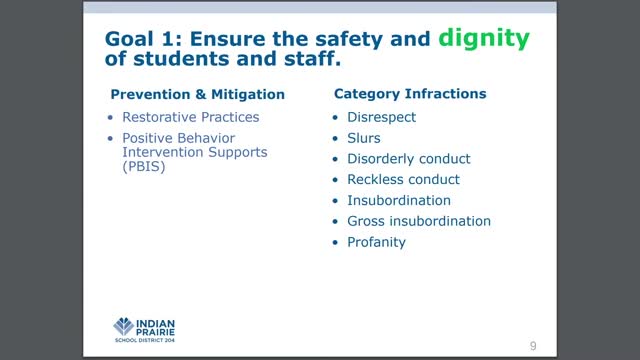Educators push for transformative shift in school discipline
August 21, 2024 | Indian Prairie CUSD 204, School Boards, Illinois
This article was created by AI summarizing key points discussed. AI makes mistakes, so for full details and context, please refer to the video of the full meeting. Please report any errors so we can fix them. Report an error »

In a recent government meeting, discussions centered on the implementation of restorative practices in schools, emphasizing a significant shift from traditional punitive discipline systems to a more inclusive and supportive approach. The focus was on fostering school culture and inclusion, aligning with the district's equity statement.
Speakers highlighted that restorative practices aim to build, maintain, and repair relationships within the school community, providing a pathway for equitable discipline and support. This approach encourages a transition from punishment to consequences that promote learning opportunities, allowing students to develop essential social and emotional skills over time.
The meeting underscored the importance of pairing support with accountability, noting that while restorative practices do not replace traditional disciplinary tools, they can lead to a substantial decrease in suspension and expulsion rates. Training sessions for administrators and their teams were conducted to equip them with the necessary skills to implement these practices effectively.
Addressing common misconceptions, participants clarified that restorative practices do involve accountability. They facilitate collaborative conversations between students and teachers about choices and behaviors, fostering personal growth and change. The discussion also pointed out that not all students arrive at school equipped with the necessary social skills, highlighting the educators' role in teaching behavior with the same dedication as academic subjects.
Overall, the meeting reflected a commitment to enhancing school environments through restorative practices, aiming to create a more equitable and supportive educational experience for all students.
Speakers highlighted that restorative practices aim to build, maintain, and repair relationships within the school community, providing a pathway for equitable discipline and support. This approach encourages a transition from punishment to consequences that promote learning opportunities, allowing students to develop essential social and emotional skills over time.
The meeting underscored the importance of pairing support with accountability, noting that while restorative practices do not replace traditional disciplinary tools, they can lead to a substantial decrease in suspension and expulsion rates. Training sessions for administrators and their teams were conducted to equip them with the necessary skills to implement these practices effectively.
Addressing common misconceptions, participants clarified that restorative practices do involve accountability. They facilitate collaborative conversations between students and teachers about choices and behaviors, fostering personal growth and change. The discussion also pointed out that not all students arrive at school equipped with the necessary social skills, highlighting the educators' role in teaching behavior with the same dedication as academic subjects.
Overall, the meeting reflected a commitment to enhancing school environments through restorative practices, aiming to create a more equitable and supportive educational experience for all students.
View full meeting
This article is based on a recent meeting—watch the full video and explore the complete transcript for deeper insights into the discussion.
View full meeting
